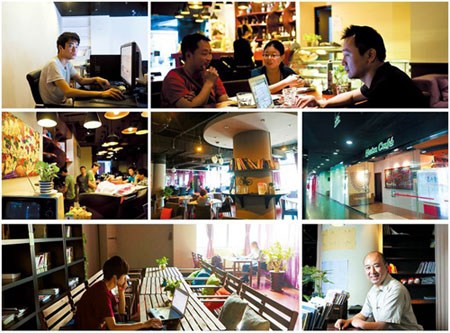(Ecns.cn)--Is it possible to rent a work station in Beijing for just several yuan per day? As it happens, it is - at Garage Café.
The café is located in Zhongguancun, China's Silicon Valley. Order a cup of coffee and you have access to a spot with a wealth of office devices, including an iPhone, tablet PC, projector, and a selection of IT books recommended by experts. Tomorrow's IT giants are here working on business plans. Investors come to scout for talent and projects.
Its most famous recent visitor was Chinese American Steve Chen, who with his partners established the popular video sharing website YouTube in an American garage. On his visit in early November he was stunned by the "garage" concept, and made the comment "So many people are starting a business at this place. Even in Silicon Valley no such hive of activity exists", reports Beijing Daily.
For entrepreneurs, Garage Café is a coffeehouse that serves as an open work environment and a bridge to investors. In the eyes of investors, Garage Café is a dynamic project library. At present, a dozen start ups are working on their IT business launch in the stalls of this café.
Garage, the dream workshop
Beta Café, Garage Café, and 3W Café were the pioneers in establishing clubs for the grassroots of the IT industry to realize their dreams.
Su Di, as an investment director of a listed company, simply longed for a fixed, quiet club to converse with IT talent. A relaxed platform for idea-sharing was the initial impetus for Su to open his coffeehouse.
He named it "Garage" because this lowly venue was where many legendary American giants in the industry actually started. In the 1939, Bill Hewlett and David Packard rented a garage in California, and cofounded the information technology corporation Hewlett and Packard. In the 1970s, Steve Jobs ran his first business out of a garage with his friend Steve Wozniak. In 1998, Larry Page and Sergey Brin established Google in a friend's garage in California.
In the IT sector, the garage functions as a studio, a flexible and inexpensive workspace that accommodates dreamers before their businesses become 'an overnight success'. There is no such equivalent in China. "There are many cheap garages in the U.S. but China is short of sites suitable for start ups" says Su. Substituting the café for the garage was his pioneering feat.
Su and his team chose a site in the west zone of Zhongguancun, a pocket jammed with high-tech companies, some already well known, and some newly emerging. It put them in the middle of "China's IT hub of resources, talent and capital" says Su.
The first customer
Garage Café opened on April 7 and Xiao Yi (alias) was one of its first customers. He is a college graduate who started his own business developing mobile client-end applications.
At the time Xiao Yi lived far away in a shabby one-floor house and showed up every morning when the café opened its doors at 8:30 a.m. "These young people not only have ambition but also can bear up under hardship", remarks Su.
Xiao Yi and his team only had the funds to keep their business going for three months. Fortunately, in the middle of May he met an 'angel investor' who habitually searches for start-up business projects at the café.
After three rounds of dialogues with Xiao Yi, the investor decided to move his capital into their project. Xiao Yi has expanded his team to 10 persons and they moved to new offices in October.
Some business made a good start at this café, and some failed. Another young man, Xiao Shun, got connections with a risk investment fund that showed a strong interest. However, the day before a contract was to be inked, Adobe launched a new type of Flash player that contained Xiao Shun's technology. It killed the deal.
In the case of IT ventures, business entrepreneurs and investors are aware that the industry changes and updates itself every moment, and grabbing opportunities ahead of competitors is critical.


















